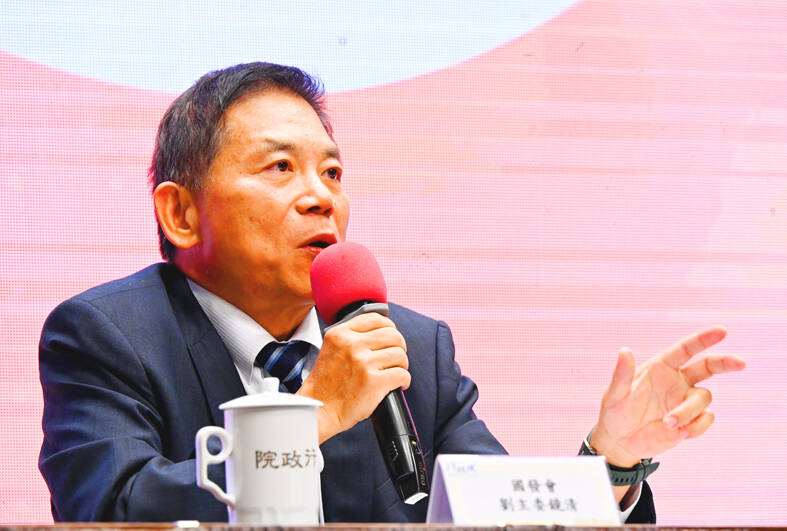The National Development Council (NDC) is to issue “digital nomad” visas for up to six months to attract global talent, NDC Minister Paul Liu (劉鏡清) said yesterday.
As the COVID-19 pandemic made remote working more common, the council is to target digital nomads, people who work remotely using technology, to boost the nation’s talent outreach, Liu said.
Southeastern countries are major labor exporters, but the government expects that by 2035, most people from those countries would stop seeking jobs overseas due to their increased income, he said.

Photo: Liu Hsin-de, Taipei Times
Attracting international talent has become even more important in these circumstances, he said, adding that countries such as Japan, South Korea and Thailand have already developed digital nomad policies.
Thailand’s Destination Thailand Visa, which came into effect on Monday, allows digital nomads to stay in the country for up to 180 days with five-year multiple entry permission.
South Korea this year implemented Workation Visa, which grants digital nomads a one-year stay that they can extend for another year.
Japan in March introduced a visa for digital nomads, allowing them to stay in the country for six month.
As Japan’s digital nomad visa is not extendable, Taiwan could take advantage of its proximity to Japan to attract people leaving the nation once Taiwan’s visa program is established, Liu said.
The government has been advertising the upcoming policy online in the UK and other palces, he added.
It is estimated that there are about 35 million digital nomads worldwide, he said.
Taiwan aims to retain 10 percent of its digital nomads, he said, adding that this would boost domestic tourism and the economy.
Currently, digital nomads travel to Taiwan visa-free or with a tourist visa that expires after three months, he said.
The council is to allow digital nomad visas that can be extended for three months, allowing a maximum six-month stay, Liu said.
The extension does not require legislative amendments and could be implemented once approved by the Ministry of Foreign Affairs, he added.
Meanwhile, to loosen restrictions on permanent residence for top-tier foreign talent, the council is to submit draft amendments to the Act for the Recruitment and Employment of Foreign Professionals (外國專業人才延攬及僱用法) to the Legislative Yuan for review during its next session, Liu said.
The bill would follow Japan’s example to launch a “global elite visa,” allowing foreign professionals with a minimum annual salary of at least NT$6 million (US$184,021) to be granted permanent residence at least one year after they arrive in Taiwan, he said.
The goal is to bring 120,000 foreign talents into Taiwan by 2028, which is expected to consist of 60,000 international professionals, 50,000 foreign and overseas compatriot students and 10,000 digital nomads, he added.

A Ministry of Foreign Affairs official yesterday said that a delegation that visited China for an APEC meeting did not receive any kind of treatment that downgraded Taiwan’s sovereignty. Department of International Organizations Director-General Jonathan Sun (孫儉元) said that he and a group of ministry officials visited Shenzhen, China, to attend the APEC Informal Senior Officials’ Meeting last month. The trip went “smoothly and safely” for all Taiwanese delegates, as the Chinese side arranged the trip in accordance with long-standing practices, Sun said at the ministry’s weekly briefing. The Taiwanese group did not encounter any political suppression, he said. Sun made the remarks when

PREPAREDNESS: Given the difficulty of importing ammunition during wartime, the Ministry of National Defense said it would prioritize ‘coproduction’ partnerships A newly formed unit of the Marine Corps tasked with land-based security operations has recently replaced its aging, domestically produced rifles with more advanced, US-made M4A1 rifles, a source said yesterday. The unnamed source familiar with the matter said the First Security Battalion of the Marine Corps’ Air Defense and Base Guard Group has replaced its older T65K2 rifles, which have been in service since the late 1980s, with the newly received M4A1s. The source did not say exactly when the upgrade took place or how many M4A1s were issued to the battalion. The confirmation came after Chinese-language media reported

The Taiwanese passport ranked 33rd in a global listing of passports by convenience this month, rising three places from last month’s ranking, but matching its position in January last year. The Henley Passport Index, an international ranking of passports by the number of designations its holder can travel to without a visa, showed that the Taiwan passport enables holders to travel to 139 countries and territories without a visa. Singapore’s passport was ranked the most powerful with visa-free access to 192 destinations out of 227, according to the index published on Tuesday by UK-based migration investment consultancy firm Henley and Partners. Japan’s and

BROAD AGREEMENT: The two are nearing a trade deal to reduce Taiwan’s tariff to 15% and a commitment for TSMC to build five more fabs, a ‘New York Times’ report said Taiwan and the US have reached a broad consensus on a trade deal, the Executive Yuan’s Office of Trade Negotiations said yesterday, after a report said that Washington is set to reduce Taiwan’s tariff rate to 15 percent. The New York Times on Monday reported that the two nations are nearing a trade deal to reduce Taiwan’s tariff rate to 15 percent and commit Taiwan Semiconductor Manufacturing Co (TSMC, 台積電) to building at least five more facilities in the US. “The agreement, which has been under negotiation for months, is being legally scrubbed and could be announced this month,” the paper said,